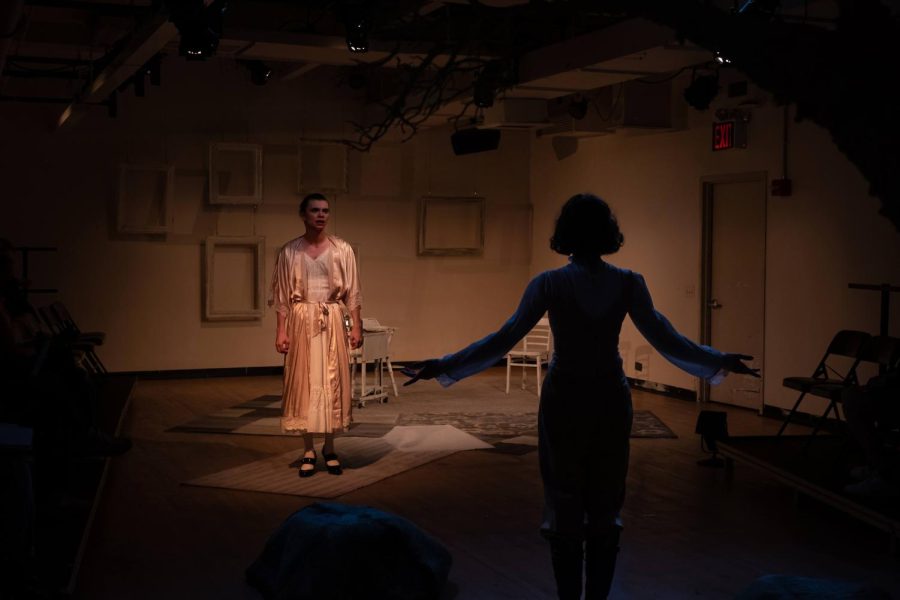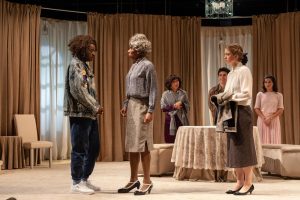‘The Moors’: A Dark and Whimsical Comedy
An illuminating inquiry into the complexities of human emotion when we’ve felt starved of it for so long
COURTESY OF HELEN HYLTON
The show opened on Nov. 6 and ran through Nov. 11 at Fordham’s Studio Theatre
November 17, 2022
Running from Nov. 6 through Nov. 11, Fordham Studio Theatre’s “The Moors,” written by Jen Silverman, centers femininity, solitude and companionship against the unforgiving and savage whimsy of its titular environment. The play focuses on the lonely estate of two sisters, their brutish Mastiff and a maid wearing many hats as they all prepare for the arrival of a young governess.
The governess, enchanted by letters she had received from the house’s master, arrives enthralled by the position and the man offering them. When the master of the house is nowhere to be found, the governess finds herself caught in the snare of cruelty, unable to escape though not actually held captive.
At the center of the play’s eerie and foreboding atmosphere lies loneliness and the desperate clawing for emotion that rises within us. The play is painstakingly human, as the frenzied need for connection binds people in love, hate and obsession. Director Manon McCollum, Fordham College at Lincoln Center (FCLC) ’24, spoke on the multifacetedness of the play, saying, “All these plots center the feeling of being truly seen, and the lengths to which we will go to get that feeling of truly being seen … again and again.”
McCollum also credited Silverman, who presented the idea that “‘The Moors’ is not at all about queer politics … moreso, there’s a loneliness … an openness to change … to being more than one thing at the same time. These are things I associate with my own experience of being queer.”
The story’s players include the cold and brutish Agatha and her younger sister Hudley. The sisters live with their maid, who goes by many names and performs many duties, all at the whim of what Agatha demands. As each person is alone and inconsequential, they are driven by their loneliness to accept connection in any form it arrives.
The estate operates to Agatha’s every will, something particularly irritating to her sister who is desperate to become anything. Hudley, played by Matt Green, FCLC ’24, desires nothing more than to be known. Subjected to neglect and critique from her sister and with no other companionship, she turns to a diary, which she reads out loud at any opportunity that presents itself. Hudley is particularly enthralled by the arrival of the governess Emilie, eager for a companion, until Emilie and everyone else diverts her attention to Agatha. The rejection of this companionship spurs Hudley’s hatred and resentment toward Agatha, a dynamic observed and taken advantage of by the maid, played by Isabella Acuña, FCLC ’25.
Emilie, played by Anne Lois Bullington, FCLC ’25, undergoes a transformation in the moors. Upon realizing the man she has been compelled to love through written correspondence is, in reality, the cruel mistress of the household, her initial heartbreak morphs into a savage tenderness for the woman. The reconciliation grounded by the harsh nature of the environment spurs on Emilie’s reclamation of autonomy and personhood, making her an actor of circumstance rather than a victim of occurrence.
Ryan Murphy, FCLC ’25, portrays Agatha with a perfect balance of harsh and soft lines, her acting breathing life into Agatha’s projection onto the moors — savage, wild, turbulent. Murphy’s performance is perfectly controlled, illuminating Agatha’s need to keep herself tame by allowing a measured cruelty. Murphy gives an expert portrayal of Agatha’s shock and disarmament when this affection is returned. She never forfeits the regimented viciousness of Agatha but reveals a selective softness simultaneously. Her performance is a true study of conflicting human emotion.
Persuasion becomes centered as a cornerstone of the play, as each character’s desire to be seen leaves them desperate for a manipulated affection and malleable to the wills of others. Each character’s loneliness feeds off one another and leaves them straining for what breeds the connection they so yearn for. Even Mastiff feels this loneliness, desperate for love in any form and willing to do anything to secure it.
The Mastiff, played by Asa Nestlehutt, FCLC ’24, encounters a Moor-Hen, played by Melissa Bautista, FCLC ’24, after she becomes injured from a crash landing, a frequent occurrence in the moors. Mastiff and Moor-Hen rarely interact with other characters, but their story serves as a fabling of the larger plot. Nestlehutt plays the Mastiff with desperation culminating in aggression and control — a refusal to be left alone again. Their narrative exposes the animalistic nature of the toxic relationships displayed. At the crux of many relationships lies the fleeting intangibility of happiness, the instability of love being harder to accept than the absence of any love at all.
McCollum designs a masterful iteration of “The Moors,” using the lighting, sound and set design to reflect the actors’ conflicting emotions. He presents an adaptation that centralizes the openness essential to Silverman’s writing of the play while still fostering the feeling of being trapped in something insurmountable to overcome. A compelling play punctuated with a strong directorial vision and dynamic cast, “The Moors” championed as a Studio Show.












